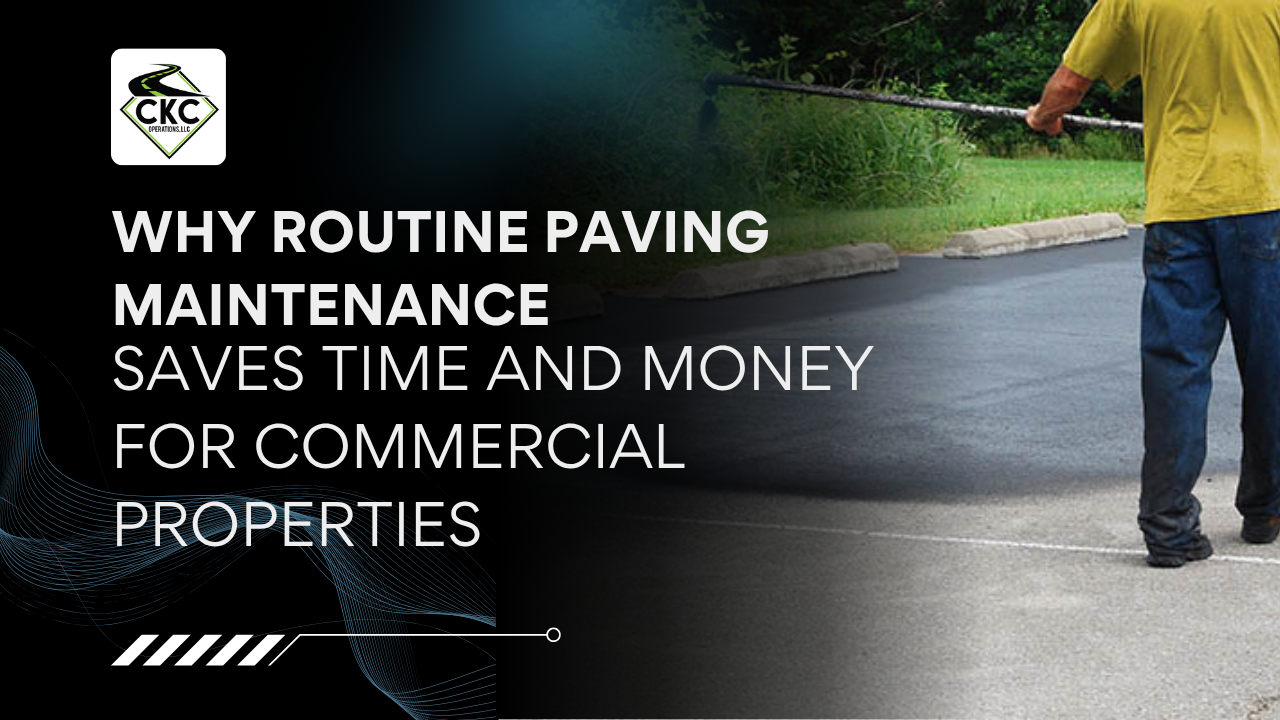- CKC Operations, LLC
3843 S. Highway 40
Roosevelt, UT 84066 - 435-646-3311
info@ckcoperationsllc.com

“It’s just a few cracks, it can wait.” That statement may seem harmless, but it’s one of the most expensive assumptions commercial property managers make. Pavement isn’t just asphalt or concrete; it’s the first point of contact your customers, tenants, or clients experience. And yet, it’s often overlooked until something goes wrong.
Commercial properties see high volumes of traffic both vehicular and pedestrian. Over time, exposure to sunlight, heavy loads, oil leaks, rain, and temperature changes takes a toll.
What starts as a small crack can evolve into a large pothole or structural damage. These problems don’t just affect curb appeal—they create safety hazards, damage vehicles, and open the door to potential legal claims.
That’s why smart businesses invest in routine paving maintenance. It’s not a cost—it’s an insurance policy that protects your property’s value and your brand’s reputation.
You might not notice the damage immediately. Pavement erosion is slow and often internal—what lies beneath the surface can be more dangerous than what you see on top.
When cracks and surface breaks aren’t sealed, water infiltrates the sub-base. Over time, this leads to erosion, freeze-thaw damage, and unstable surfaces. Once the base layer is compromised, simple maintenance won’t be enough. You’ll be facing reconstruction at five to ten times the cost.
For commercial businesses, the ripple effects are significant. Uneven surfaces lead to liability issues. Poor drainage causes standing water, increasing the risk of slips, falls, and mold. Vehicles parked in pothole-ridden lots get damaged, leading to frustrated tenants or customers. Worst of all? Emergency repairs cause major downtime, affecting deliveries, employee access, and foot traffic.
In short, delayed maintenance becomes a silent revenue drain.
Routine paving maintenance isn’t just about patching cracks—it’s a systemized approach to preserving the strength, appearance, and functionality of your surfaces.
Some of the key services include:
Each of these tasks may seem minor, but together, they extend the life of your pavement by years—saving you thousands in premature repairs.
Emergency repairs are not just costly—they’re inconvenient. You’ll likely have to cordon off entire sections of your property, delay business operations, and possibly reschedule deliveries or client appointments.
By contrast, routine maintenance allows you to plan ahead. Most tasks can be done during non-peak hours or weekends, ensuring your operations remain unaffected.
More importantly, preventive care helps you stay in control. You’re not reacting to problems—you’re preventing them. That’s time saved on inspections, paperwork, repair coordination, and customer complaints. You’ll no longer scramble to fix issues after a storm or heatwave. Instead, your property will be ready, resilient, and reliable.
A clean, smooth surface reduces risks. Potholes, cracks, or poor signage can lead to accidents involving pedestrians, cyclists, or drivers. These incidents don’t just result in injuries—they often lead to lawsuits and insurance claims.
Good maintenance means fewer hazards. Sealcoating reduces slickness, clear striping improves vehicle flow, and regular cleaning prevents slippery surfaces caused by debris or oil buildup.
Safety isn’t just compliance—it’s a commitment. When visitors, tenants, and staff feel safe on your property, it boosts your reputation as a reliable and responsible operator. That’s something that no marketing campaign can buy.
Before anyone enters your building, they’ve already formed an opinion—based on your parking lot or driveway.
A well-maintained pavement signals professionalism, care, and attention to detail. On the other hand, cracks, weeds, faded stripes, and standing water give off a sense of neglect. Even if the inside of your business is pristine, poor exterior conditions can make clients think twice.
Your pavement is a reflection of your brand. Just like polished windows or trimmed landscaping, fresh blacktop and crisp striping speak volumes. It’s a silent but powerful message: “We care about every part of your experience here.”
Not sure how often to invest in maintenance? Here’s a practical guide for property owners and facility managers:
By following this timeline, you avoid the snowball effect of minor issues turning into major problems.
Your pavement is one of the most important and expensive assets of your commercial property. But it’s also one of the easiest to maintain when approached proactively.
Routine paving maintenance ensures more than just a clean lot. It gives you predictability, safety, visual appeal, and financial control. It protects your reputation, improves customer experience, and extends the life of your investment.
At CKC Operations LLC, we specialize in long-term pavement health. From sealcoating to striping, we serve businesses that understand the value of consistency and professionalism. Whether you’re managing retail centers, office complexes, or warehouses, we become your behind-the-scenes support team—keeping your surfaces strong, safe, and spotless.
Want to reduce liability, increase curb appeal, and save thousands in future repair costs?
Contact CKC Operations LLC today for a free on-site pavement assessment and personalized maintenance plan.
Let us help you build trust, starting from the ground up.